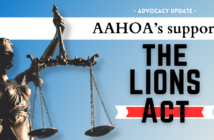Examining the political advocacy of three AAHOA Members
by CARTER DAVIS
Regardless of ethnicity, religion, income, background, or any other seemingly life-defining and limiting factors, there is one overarching theme that has proven itself true time and again within the American experience: Within reason, your future is largely of your own making. The American experience is littered with examples of people altering their trajectories through resilience, perseverance, and intentional dedication.
To wit: “The only person you are destined to become is the person you decide to be.” – Ralph Waldo Emerson
These words, from the famed 19th-century American author’s book, “Self-Reliance,” are a testament to the power of human will and the ability we possess to shape our own destinies. And they should ring constantly and as clear as crystal in the ears of any man or woman who goes into business for him or herself.
Business owners should abhor complacency, despite the innumerable obstacles thrown their way that usually require monumental effort to overcome. And AAHOA Members are nothing if not a group with a proven track record of success, so it should come as no surprise that AAHOA counts among its ranks many hoteliers who are deeply engaged in the political process and take an active role in shaping the industry’s future by developing relationships with legislators at all levels of government.
GET INVOLVED
If you gathered several dozen AAHOA Members in a room, it’s likely many would recount a specific situation or culmination of incidents as the “a-ha” moment that led to them to dip their toes in the political waters in an attempt to have more oversight in managing their own businesses. In fact, each AAHOA Member interviewed for this article expressed nearly the same sentiment.
“I began my involvement in politics locally when I became frustrated with the local building inspectors becoming unreasonable in their code enforcement,” recalled Premier Hospitality CEO and AAHOA Southwest Region Director Imesh Vaidya. “The regional and national involvement developed from the onslaught of ADA lawsuits in my region. The inability of the legislative branch to prevent the frivolous lawsuits, which continue today, was the stimulus for my increased engagement in politics.”
That involvement, Vaidya said, took the form of providing information to politicians and campaign donations, and it has resulted in building strong, tangible relationships with many government leaders, including those in New Mexico, Arizona, Colorado, and Utah, where he cited “very strong relationships” with mayors, state legislators, attorneys general, state cabinet members, and governors.
“Also,” he added, “the constant communication with our congressional delegations in these states has been quite beneficial on the national level in having our voice amplified on topics such as the ADA lawsuits, 1031 exchange, minimum wage, and federal aid for the hospitality industry during the pandemic.”
And those relationships are continuing to pay dividends. Vaidya points to local and state-level successes such as legislation allowing a 60-day cure period for ADA lawsuits in Arizona, limiting the increase in minimum wage in Colorado, the prevention of a tax increase in Utah, and delaying sick leave proposals in New Mexico.
“Involvement in politics at any level,” he said, “will benefit our industry by protecting our assets and reducing burdensome legislation and costs.”
BE INFORMED
A phrase that gets thrown around to varying effect during election seasons is “If you don’t vote, don’t complain,” and that logic is echoed by Montu Patel, Principal at Lotus Park Senior Living and President of IHM.
“When you don’t make your voice heard, don’t complain afterward,” said Patel, who traces his own political awakening in part to an AAHOA Legislative Action Summit. “Don’t be surprised when tax increases, greater regulation, lawsuits, or other small-business issues impact your livelihood. Just know that other groups are advocating for their issues, which could put you out of business.”
And Vaidya cautions against thinking that advocacy is only necessary based on the prevailing political climate of the moment. Regardless of the party in power, the governing philosophies being espoused by the leaders at present, the economy’s overall health, or any other factors, it’s vital to maintain vigilance in political awareness and activity.
“There are always groups that wish to impose additional burdens and taxes on business,” he said. “Constant involvement allows the industry to have a say in the drafting of the legislation instead of reacting to it.”
It’s a sentiment echoed by Patel who made the point that “Political advocacy is about education and consistency. Having memorable and impactful messages to our lawmakers is much more important than the political climate of the day.”

HIDESY/ SHUTTERSTOCK.COM
THE PEN IS MIGHTIER THAN THE SWORD
Danny Gaekwad is an investor, entrepreneur, and hotel owner with a long history in the hospitality industry. To hear him tell it, political advocacy on behalf of the industry to which he’s dedicated the majority of his life is almost as natural as breathing.
“It’s very simple,” said Gaekwad, who also serves as Chair of the AAHOA Government Affairs Committee. “There are factors affecting your business you will not be able to control, or at least affect, without being active politically. To ignore that is irresponsible, reckless, and foolish.”
And though he is a tireless networker and industry advocate with a list of government contacts in his phone deeper than the Mariana Trench, his advice is remarkably simple. For any campaign donation made, require the politician to show up in person to collect the check and use that as the jumping-off point.
“We are building relationships,” he said. “Anyone can write a check, but this is all about the relationship. It’s a slow process, and the money opens the door, yes. But without a relationship, your money means nothing. It’s not a cookie jar. You can’t just put your hand in and keep expecting to get something if you don’t put something in yourself.”
Gaekwad’s philosophy, like so many active in politics, is one of insurance. After all, don’t we all maintain numerous policies on our vehicles, homes, property, health and much more? Political engagement, he reasons, is essentially a form of livelihood insurance.
“Why wait for the catastrophe to happen?” he asks. “Because it will happen if your head is in the sand. Would you rather have a relationship in place already that can help you prevent a totally avoidable disaster, or would you rather wait for the storm to hit to come up with a plan? It’s great to run a profitable business, and money is great. But money without power is useless.”




